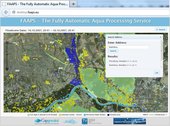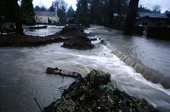 Building on its use of satellites for responding to disasters, ESA has helped to create a service that makes flood maps available simply via the Internet.
Building on its use of satellites for responding to disasters, ESA has helped to create a service that makes flood maps available simply via the Internet.
Floods can be devastating, as seen recently in Germany and central Europe. Knowing the extent of a flood and understanding how it might develop is essential for teams responding to the emergency.
Traditionally, this is often worked out using ground and airborne sensors along with historical flood maps. Invariably, these different sources of information, often from incompatible systems, must be pieced together in a hurry by emergency teams.
But they cannot provide the full picture, especially when it comes to extensive floods and bad weather.
 ESA has collaborated with Capgemini, GeoVille Information Systems, Vienna University of Technology and Luxembourg.s Gabriel Lippmann research centre to develop a simple, easy-to-use system that could be available to anyone online.
ESA has collaborated with Capgemini, GeoVille Information Systems, Vienna University of Technology and Luxembourg.s Gabriel Lippmann research centre to develop a simple, easy-to-use system that could be available to anyone online.
Near-realtime satellite radar measurements are processed to create location-specific flood maps and deliver them via the Internet.
Satellite readings are processed using cloud computing and made available within hours to workstations as well as common devices such as PCs, laptops, tablets and smartphones.
The service provides historical flood maps for crisis planning, near-realtime flood maps for use by emergency response units, and damage assessment maps after a flood.
The service was recently introduced to around 70 people from emergency organisations in Austria, Styria and Slovenia who gathered in Bad Radkesburg, Austria, for a disaster exercise.
 Historical data from ESA.s Envisat radar were used to provide maps. Participants found the system easy to use and feedback will help to add improvements.
Historical data from ESA.s Envisat radar were used to provide maps. Participants found the system easy to use and feedback will help to add improvements.
This Fully Automated Aqua Processing Service, or FAAPS, was developed and demonstrated through ESA.s Integrated Application Promotion.
Rudolf Hornich, Coordinator for Flood Risk Management in the provincial government of Styria, elaborates on the approach: .Owing to the numerous disastrous floods in recent years, the province of Styria is constantly striving to contribute to innovative projects in managing flood risks.
From FAAPS we expect up-to-date information for emergency services in crisis and disaster management and support in the evaluation, analysis and documentation of large-scale flood events..
It is envisaged that ESA.s Sentinel-1 satellite will feed radar measurements into the service. When the European Data Relay System becomes operational, its observations will be available even faster as they are relayed to ground stations wherever needed.
 According to ESA.s Olivier Becu, .FAAPS is an excellent example of the added value of satellite data made accessible to crisis management teams for aiding rescue operations.
According to ESA.s Olivier Becu, .FAAPS is an excellent example of the added value of satellite data made accessible to crisis management teams for aiding rescue operations.
In the near future, we expect many operational services to be rolled out in Europe leveraging on space assets to the benefits of users communities and citizens, presenting new business opportunities to industry and operators..


